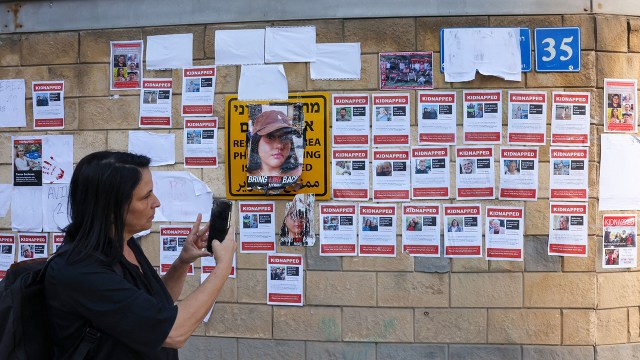
Most Israeli adults do not post or share about political and social issues online – including the war between Israel and Hamas, according to a Pew Research Center survey conducted from March 3 to April 4, 2024.
And at least half of Israeli adults say certain kinds of social media posts related to the war should not be allowed, such as content that is graphic, incites violence or expresses support for Hamas.
This Pew Research Center analysis focuses on Israelis’ social media use and their views of censorship of social media content related to the Israel-Hamas war.
The data is from a survey of 1,001 Israeli adults conducted face-to-face from March 3 to April 4, 2024. Interviews were conducted in Hebrew and Arabic, and the survey is representative of the adult population ages 18 and older, excluding those in East Jerusalem and unsanctioned outposts. (The survey also did not cover the West Bank or Gaza.) The survey included an oversample of Arabs in Israel. It was subsequently weighted to be representative of the Israeli adult population with the following variables: gender by ethnicity, age by ethnicity, education, region, urbanicity and probability of selection of respondent.
Prior to 2024, combined totals were based on rounded topline figures. For all analyses beginning in 2024, totals are based on unrounded topline figures, so combined totals might be different than in previous years. Refer to the 2024 topline to see our new rounding procedures applied to past years’ data.
Here are the questions used for this analysis, along with responses, and the survey methodology.
Few Israelis discuss political or social issues, war in Gaza on social media
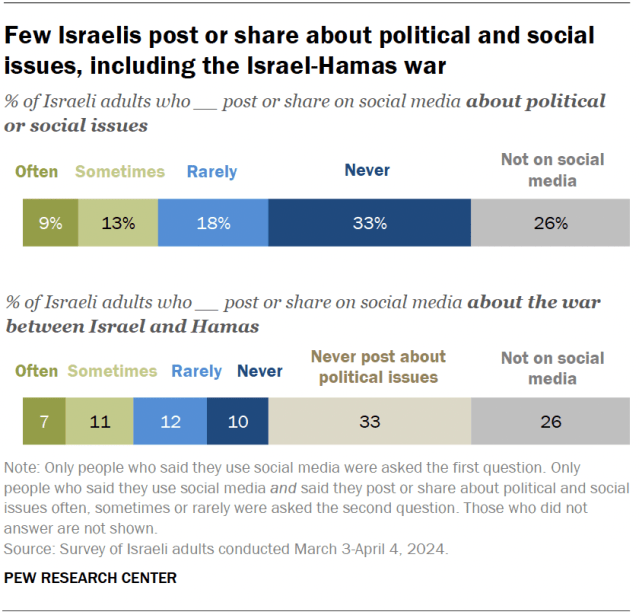
About three-quarters of Israelis (74%) use social media. But fewer than a quarter (22%) say they post or share about political and social issues often or sometimes. Roughly half (51%) say they rarely or never do.
We asked Israelis who use social media and post or share about these issues often, sometimes or rarely whether they post or share about the Israel-Hamas war. Just 18% of Israeli adults say they do so with any regularity.
While Israelis’ overall social media use has not changed much since 2022, the percentage who say they post or share about social or political issues at least sometimes has decreased from 36% to 22% in that time.
Arab Israelis are more likely than Jewish Israelis to say they post or share about political or social issues at least sometimes (28% vs. 20%). However, Jews are about twice as likely as Arabs to do so about the Israel-Hamas war specifically (20% vs. 11%). About a quarter of Arab Israelis (24%, a plurality among those asked) say they never post or share content about the war. Only 6% of Jewish Israelis say the same.
Since October, Israeli authorities have detained dozens of Arab citizens over their social media posts related to the war. Many others have faced disciplinary measures at work or school for things they shared online, according to rights groups based in Israel.
Many Israelis feel social media content about the war should not be allowed
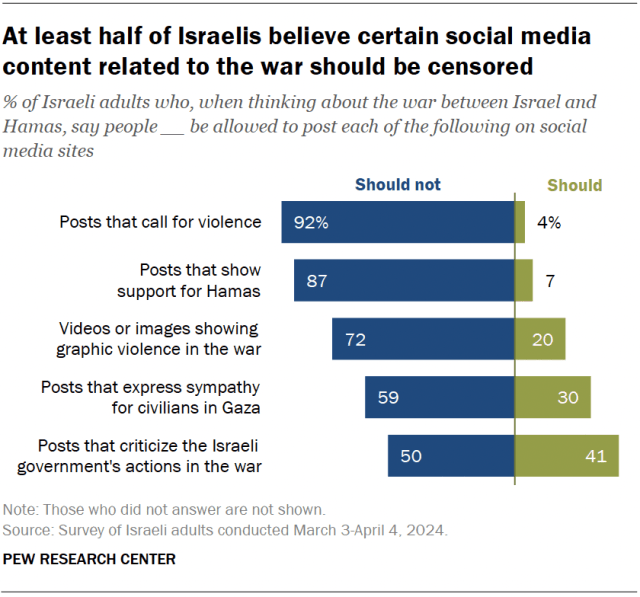
Whether they post on social media themselves or not, pluralities of Israelis believe that posting certain kinds of content related to the Israel-Hamas war should not be allowed.
- About nine-in-ten Israelis say posts that call for violence (92%) or express support for Hamas (87%) have no place on social media.
- 72% of Israelis want posts that include videos or images of violence in the war to be censored. Only 20% say graphic content should be allowed.
- The share of Israelis who say posts that express sympathy for civilians in Gaza should be kept off social media (59%) is about double the share who say these posts are acceptable (30%).
- Israelis are most divided on posts that criticize their government’s actions in the war. Half say those posts should be censored, while 41% disagree. Supporters of Prime Minister Benjamin Netanyahu’s coalition government are much more likely than nonsupporters to say posts criticizing the government should not be allowed (69% vs. 39%).
Jewish and Arab Israelis feel differently about social media content related to the war
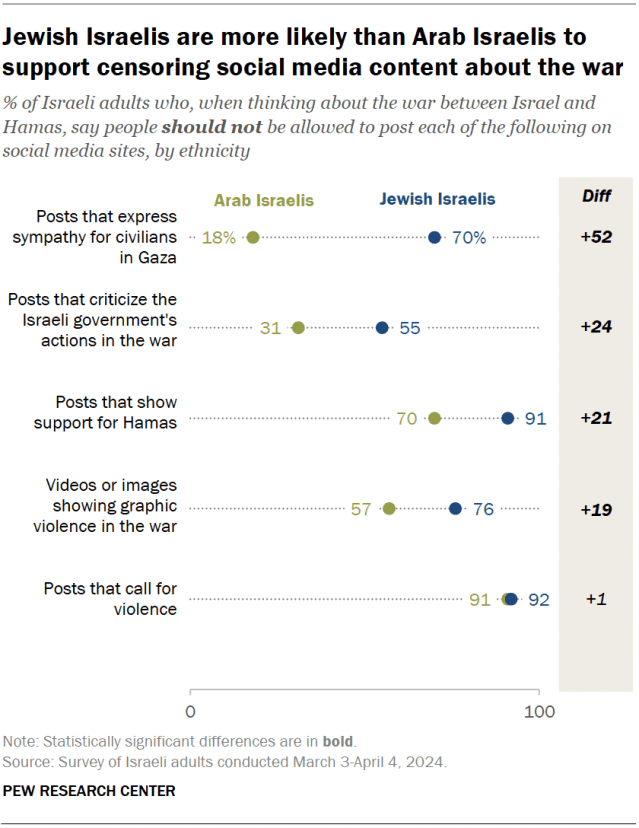
Jews and Arabs in Israel have different views of social media posts about the war. This is especially true of posts that show sympathy for civilians in Gaza: While 70% of Jews say these posts should not be allowed, just 18% of Arabs agree.
Similarly, 55% of Israeli Jews say posts that criticize the government’s handling of the war should be censored, compared with only 31% of Israeli Arabs. A 58% majority of Arabs say posts that are critical of Israel’s government are acceptable.
(This survey was conducted from March 3 to April 4, 2024. Read more about Israelis’ views of the Israel-Hamas war in our May report and June report.)
Majorities of Jews and Arabs support censoring posts that show graphic violence (76% and 57%) or express support for Hamas (91% and 70%). When asked about the latter, 20% of Arabs either said they did not know or declined to respond.
Ideological differences in views of social media posts about the war in Gaza
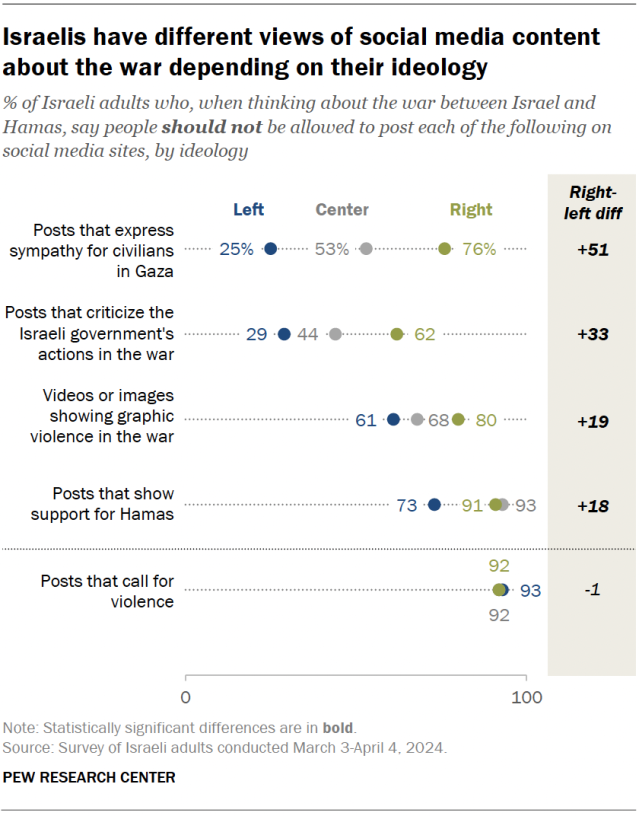
There are also differences between Israelis on the ideological right, center and left in their views of social media posts about the war.
The gap is largest for posts that are sympathetic to Gazan civilians: 76% of those on the right believe these posts should not be allowed, while only 25% of those on the left agree. Among those in the center, 53% say this content should be censored, 26% disagree and 21% did not answer the question.
Most Israelis on the right (62%) believe posts that criticize the country’s right-wing government and its actions in the war should not be allowed. That is more than double the share on the left who feel this way (29%). Israelis in the center fall in between, with 44% saying these posts should be censored.
Eight-in-ten Israelis on the right believe that posts that show violence in the war are not acceptable. Smaller majorities of Israelis in the center (68%) and on the left (61%) feel similarly.
At least 90% of Israelis in all the demographic groups we looked at – Jews and Arabs, and ideological right, left and center – say posts that incite violence should not be allowed.
Note: Here are the questions used for this analysis, along with responses, and the survey methodology.
